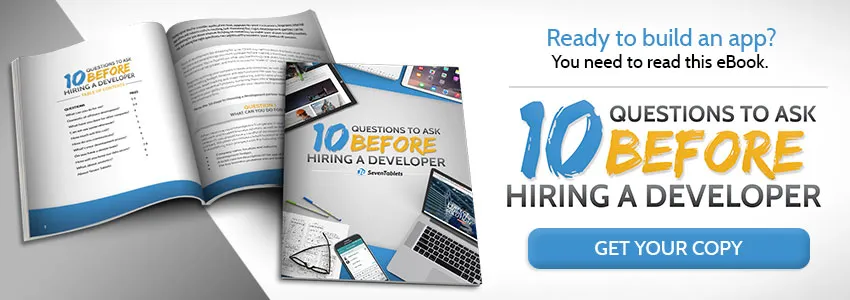Getting started with a mobile app development project can be stressful and time-consuming, particularly if you’re unsure what to expect. As such, proper planning is key to ensuring your developer has all the information and insight they need to craft an incredible application that meets your needs and surpasses your expectations. So, what points will you need to consider prior to the start of your development project?
Consideration #1: Does Your Budget Align With Your Expectations?
Building an app can get pricey and many companies go into the development process with an unrealistic expectation of how much it will cost to create the app they’re envisioning. So, before you get started, check that your expectations align with your budget. If not, then a bit of adjustment will be necessary.
To make matters more complex, each mobile app is unique and this can make it challenging to accurately predict development cost. Generally speaking, though, there are four app pricing tiers that can be used as a guide to determine a ballpark cost estimate. Variables impacting cost include the degree of customization, the type of technology that will be integrated into the application, the complexity and “newness” of the app’s technology and the level of innovation required to make your vision a reality.
Of course, the most accurate way to determine development cost is to speak with a few app developers who can provide price quotes based on your unique project specs. Also, remember that you get what you pay for to some degree, so it’s wise to ask a prospective developer for samples of their work so you can get a good feel for the quality and style of their apps. Ideally, you should review work samples that include tools, features and functionalities you would want to include in your own application.
Consideration #2: Have You Collected Everything You Need to Proceed?
Developers commonly require a number of items and approvals from clients before they begin the active development phase. This may include items such as:
- Images, graphics and color codes for branding consistency.
- Mockups and specific examples of layouts, features, functionalities and tools you’d like to include.
- Text and other content for key pages within the app.
- A list of devices and operating system versions that must be compatible with the app.
- An overview of features and functionalities to include.
- A detailed app architecture plan (think the app’s equivalent of a website’s sitemap).
- Approval of the project plans, including an outline of each development phase and time frame.
These items must be provided to the developer in a timely manner or your project could see significant delays. In fact, timeframe is such a significant issue that we’ve named it as our third key consideration.
Consideration #3: Are You Allowing for a Sufficient Development Time Frame?
It’s not uncommon for a company to place lots of pressure on a mobile app developer in an effort to ensure the application is completed on time. Often, the app’s completion may be a prerequisite for additional projects, from in-house staff training sessions for a new ERP app to a massive marketing campaign for a consumer-facing B2C app or the launch of a website for the application.
But is your deadline realistic? Are you allowing for potential roadblocks that may arise? Does your schedule provide sufficient time for beta testing to ensure a smooth user experience and good device compatibility?
There is no one-size-fits-all formula when it comes to determining the ideal development timeframe, as each project differs greatly. A small, simple native app for iOS may take just weeks to develop, whereas a complex hybrid app could take months to develop properly and test. For this reason, it’s important that you listen to your developer and pad the anticipated time frame by 20 percent to account for any unexpected hang-ups (which can occur with any type of custom software development).
Also, you’ll need to ensure you fulfill your role within the time frame, too. For instance, it’s common for a developer to hand the app over to the client for review when the first version is complete. Once the ball is in your court, conduct the review in as quickly and thoroughly as possible so the developer can finalize the application interface on time.
You want to avoid a scenario where you’re forced to make difficult decisions or even lose money because you didn’t plan appropriately. It’s best to remain flexible whenever possible and choose a developer who understands the importance of adhering to a set schedule. This is one important issue to address if you contact a development firm’s past clients to obtain a reference.
Every mobile app development project is unique and as such, you never know exactly what obstacles or challenges you’ll encounter. For this reason, it’s important to be flexible and realistic throughout the process. Working with an experienced development team can ensure you enjoy a smooth app build with minimal issues. That’s precisely what you’ll enjoy when you work with the team at 7T. Our developers are well-versed in emerging technology such as augmented reality, artificial intelligence, natural language processing, machine learning, predictive analytics and blockchain. This experience means we’re in the perfect position to integrate cutting-edge technology into your new application.
Based in Dallas, 7T works with clients throughout Texas including Austin, Houston and beyond. If you’re ready to discuss your project, contact our team today.











